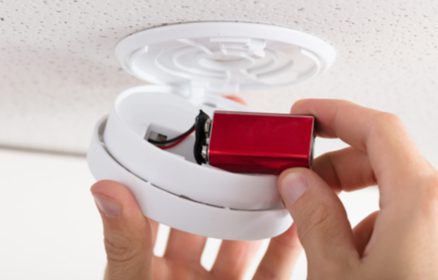Smoke detectors are one of the most important safety devices you can install in your home to protect your personal belongings and your family. The good news is, they are inexpensive, too. Once you’ve installed smoke detectors, it is absolutely necessary to test them regularly to ensure that they will sound during a fire. After all, what good are they if they are not working when you need them the most!
Types of Smoke Detectors
When selecting a smoke detector, keep the following in mind:
- Photoelectric units are better for smoldering fires, such as electric fires in the walls, so they are ideal for kitchens and bathrooms where these fires tend to occur.
- Ionization units give nearby air an electrical charge and then measure whether the charge stays constant or whether a fire is consuming oxygen in the air. These units are better suited to areas where fires get out of control, such as a basement near a furnace.
Testing a Smoke Detector
To ensure that smoke detectors are working properly, test them on a regular basis. To do so:
- Press the test button on the unit and wait for it to sound.
- Light a candle and hold it six inches below the detector so the heated air will rise into the detector.
- If the alarm does not sound within 20 seconds, blow out the candle and let the smoke rise.
- If the alarm still does not sound, open the detector up and clean the unit. Also make sure that all of the electrical connections are in good working order.
- Then, test the unit again. If it is still not working, replace it immediately.
Helping you to avoid claims is just one of the many value-added services we provide. Call us today to learn more about all of our personal risk management solutions for your auto, home and life
Safety First
Replacing smoke detector batteries is critical to their usefulness. A great way to remember to change your smoke detector batteries in your home is to do so twice a year during Daylight Saving Time. When you reset your clocks forward or back, also change those batteries to keep your home and your family safe!
Also, as a best practice changing out the entire unit every 8 years.
Material posted on this website is for informational purposes only and does not constitute a legal opinion or medical advice. Contact your legal representative or medical professional for information specific to your legal or medical needs.



